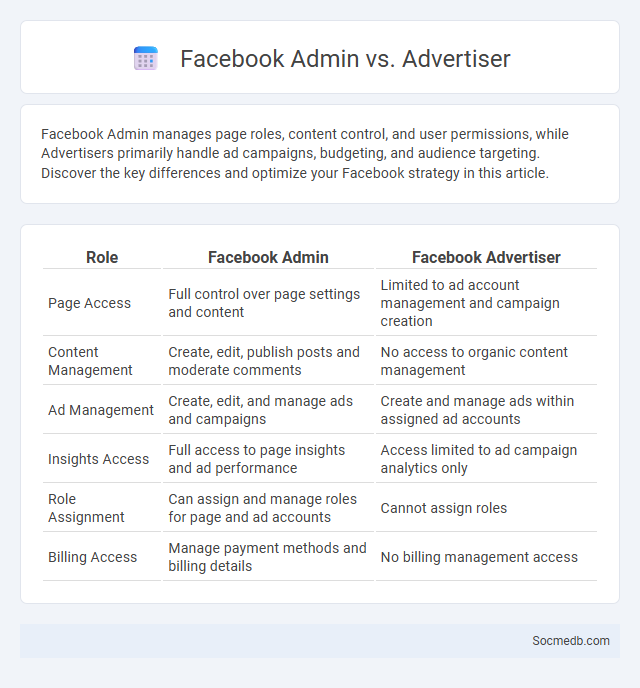
Photo illustration: Facebook Admin vs Advertiser
Facebook Admin manages page roles, content control, and user permissions, while Advertisers primarily handle ad campaigns, budgeting, and audience targeting. Discover the key differences and optimize your Facebook strategy in this article.
Table of Comparison
| Role | Facebook Admin | Facebook Advertiser |
|---|---|---|
| Page Access | Full control over page settings and content | Limited to ad account management and campaign creation |
| Content Management | Create, edit, publish posts and moderate comments | No access to organic content management |
| Ad Management | Create, edit, and manage ads and campaigns | Create and manage ads within assigned ad accounts |
| Insights Access | Full access to page insights and ad performance | Access limited to ad campaign analytics only |
| Role Assignment | Can assign and manage roles for page and ad accounts | Cannot assign roles |
| Billing Access | Manage payment methods and billing details | No billing management access |
Understanding Facebook Roles: Admin vs Advertiser
Facebook roles define different levels of access and control within a Facebook Page, with Admins having full control, including managing roles, settings, and content, while Advertisers focus mainly on creating and managing ads without administrative privileges. Understanding these distinctions helps you assign the right permissions to your team, ensuring secure and effective page management. Properly configuring roles can enhance your marketing strategy by balancing control with operational flexibility.
Key Responsibilities of a Facebook Admin
A Facebook Admin manages page content, ensuring posts, images, and videos align with brand guidelines and engage the target audience effectively. They monitor user interactions, promptly responding to comments and messages to maintain a positive online community. Data analysis of post performance and audience insights shapes future content strategies to optimize reach and engagement.
Core Duties of a Facebook Advertiser
Facebook advertisers are responsible for creating, managing, and optimizing ad campaigns to boost brand visibility and engagement. They conduct audience research, set precise targeting parameters, and monitor key performance indicators such as click-through rates and conversion metrics. Analyzing data trends and adjusting bids and ad creatives ensures maximum return on ad spend and campaign effectiveness.
Permission Levels: Admin vs Advertiser
Social media platforms distinguish between Admin and Advertiser permission levels to streamline account management and advertising efforts. Admins possess full control, including access to page settings, content management, and user roles, enabling comprehensive oversight. Advertisers have restricted access focused on creating and managing ads without altering page settings, ensuring security while facilitating targeted marketing campaigns.
Setting Up Roles on Facebook Business Manager
Setting up roles on Facebook Business Manager enables precise access control for team members by assigning specific permissions like admin, editor, or analyst. Proper role configuration enhances security and streamlines collaboration by limiting access to sensitive assets such as ad accounts, pages, and payment methods. Managing roles effectively ensures accountability and optimizes workflow efficiency within digital marketing campaigns.
Managing Page Access and Security
Managing page access on social media platforms requires implementing role-based permissions to control who can publish, edit, or moderate content. Enabling two-factor authentication (2FA) significantly enhances security by adding an extra layer of protection against unauthorized access. Regularly reviewing and updating admin roles helps prevent security breaches and ensures that only trusted individuals have control over the page.
Advantages of Each Facebook Role
Facebook offers distinct roles such as Admin, Editor, Moderator, Advertiser, and Analyst, each providing specific advantages tailored to your needs. Admins have full control over page settings and user management, Editors can create and edit content to engage audiences effectively, while Moderators focus on community interaction by managing comments and messages. Advertisers optimize ad campaigns targeting precise demographics, and Analysts provide valuable insights through in-depth performance metrics to enhance your social media strategy.
Potential Risks and Limitations
Social media platforms expose users to potential risks such as privacy breaches, cyberbullying, and misinformation spread, which can significantly impact Your mental health and online security. Algorithm-driven content can create echo chambers that limit exposure to diverse perspectives, fostering polarization and biased worldviews. Understanding these limitations is crucial for responsible usage and protecting Your digital footprint.
Best Practices for Role Assignment
Effective role assignment in social media management enhances content consistency and audience engagement by clearly defining responsibilities such as content creation, moderation, and analytics monitoring. Assigning roles based on team members' strengths and expertise ensures efficient workflow and timely responses to user interactions. Utilizing tools like social media management platforms can streamline role distribution and performance tracking, optimizing overall campaign success.
Choosing the Right Role for Your Team
Selecting the ideal social media role for your team enhances content creation, community management, and analytics efficiency. Assigning specialists in content strategy, graphic design, and data analysis ensures targeted audience engagement and measurable growth. Leveraging team strengths aligned with platform-specific demands drives brand visibility and fosters authentic connections.
 socmedb.com
socmedb.com